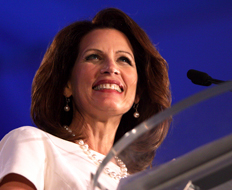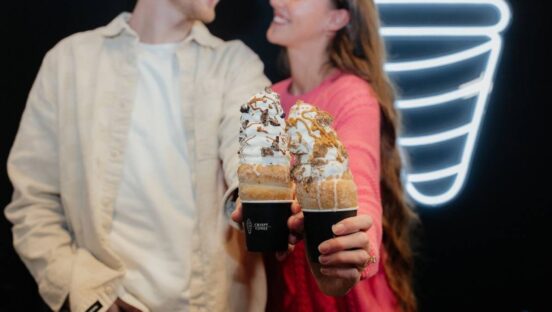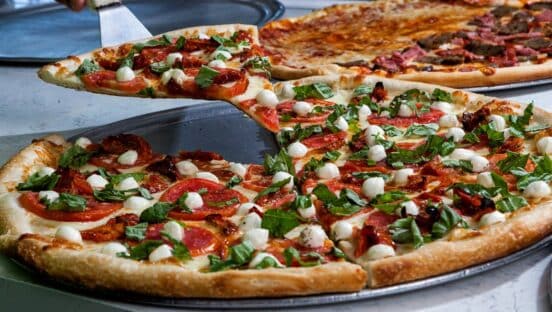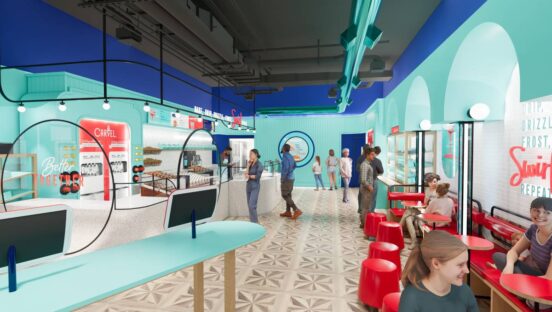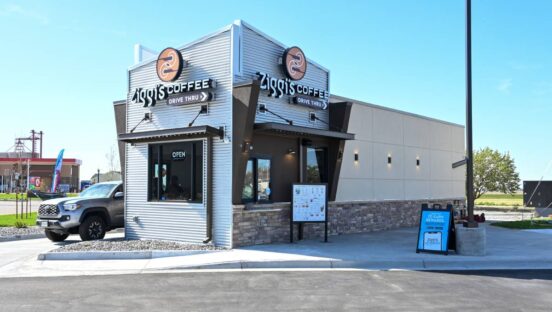On Sunday, July 3, dozens greeted a tour bus rolling into the parking lot of the Pizza Ranch restaurant in Carroll, Iowa. Out of the bus and into the drizzle stepped Michele Bachmann, the Minnesota representative who sits amid a crowded GOP presidential field.
Just one week before her visit to the Carroll location, another Republican presidential candidate, former House speaker Newt Gingrich, visited a Pizza Ranch outlet in Indianola, Iowa.
As it turns out, Pizza Ranch is becoming quite the destination for presidential candidates traveling Iowa in advance of the 2012 primaries. According to Pizza Ranch COO Jon Moss, Pizza Ranch’s emerging popularity with candidates has happened all on its own.
“We’ve got community rooms in every store and growing political attention in the state that has naturally allowed us to become a target for campaigns,” Moss says. “We expect this to only intensify in the coming months as the primaries draw near.”
While few Americans—particularly in today’s economic climate—make the swanky steakhouse or fondue hot spot a regular dining pit stop, pizzerias and other quick serves remain a routine stop for meals out. Nothing says Average Joe quite like stuffing down pizza alongside laborers and soccer moms.
And the politicians as well as their advisors know as much, regularly entering places that define Americana (burger joints, hot dog stands, and ice cream stops among them) to paint the portrait of a candidate who hasn’t lost touch with the plight of middle America.
During the 1992 White House race, President Bill Clinton made frequent stops at McDonald’s restaurants following his morning run. Clinton would grab a coffee and chat with guests, visits later parodied on "Saturday Night Live."
Although McDonald’s never capitalized on Clinton’s visits, it resulted in media exposure estimated at more than $7 million and “indicates that it is all right to go to McDonald’s,” according to a 1992 Advertising Age story.
The politico-quick-service relationship, meanwhile, has continued into contemporary times.
In May 2009, President Obama’s impromptu stop at a Five Guys outlet in Washington, D.C., drew national attention to the growing brand, including mentions by MSNBC and The Wall Street Journal. A week after President Obama’s visit, USA Today ran a feature story on the company and its ascent. The accompanying photo showed the commander in chief ordering a slew of take-out burgers at the register.
Although restaurants generally avoid being overtly political hosting a candidate for a meal can provide compelling benefits.
At Pizza Ranch, which has 68 restaurants in Iowa and 158 outlets across nine Midwestern states, Moss says the recent visits of Bachmann and Gingrich have delivered free publicity on the local and national level. That exposure is particularly important as the company seeks to expand outside of its Midwest base. During the visits, the Pizza Ranch name, logo, signage, staffing, and customers have all appeared in newspaper photos and television shots.
In addition, the candidates’ visits have driven traffic into Pizza Ranch, giving the restaurant an opportunity to showcase its food, its environment, and its hospitality alongside a hearty stamp of approval from a noteworthy individual.
“These types of visits give celebrity status to the restaurant, which resonates in the small towns across Iowa where Pizza Ranch restaurants stand. As a result, Pizza Ranch gets put in a different category,” says Sherri Fishman, head of Illinois-based Fishman Public Relations, which guides the PR efforts of Pizza Ranch and many other quick serves.
To maximize the positive impact, however, any politician’s visit needs to move beyond an “ink for ink’s sake” philosophy, says Lorne Fisher, head of Fish Consulting, a Florida-based PR firm that advises Dunkin’ Donuts, Popeyes, and Firehouse Subs.
“The real question for operators is how to utilize that visit and leverage it for opportunities that will benefit the business,” he says.
He suggests operators offer the candidate the restaurant’s signature dish or a novel product the restaurant is seeking to promote.
Keep in mind, Fisher says, that politico visits are not a strategy for long-term success but an opportunity to induce additional gains.
Late during the 2008 presidential campaign, Obama made a stop at a longstanding deli in Florida. It was tucked in an area balanced between Democrats and Republicans. His visit brought hovering helicopters and mounds of media attention. The future president snapped a photo with staff members and the image became a piece of the deli’s in-store marketing.
Yet, the good vibes only lingered so long; the attention faded and the eatery had to return to the fundamentals of solid business. After 20-plus years, the deli has since closed its doors.
“This is no magic pill, which is all the more reason to consider the residual impact of a politician’s visit,” Fisher says.

